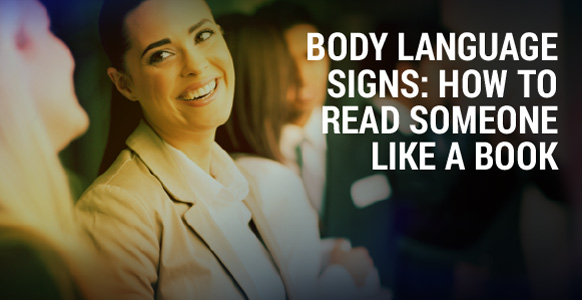
Ever catch yourself doing these things?
Yawning when you’re disinterested.
Fidgeting when you’re bored.
Faking a smile when you meet someone you don’t particularly want to engage with.
It’s almost impossible not to at times, isn’t it?
Like you simply can’t help yourself.
As if some unseen force has taken control of your body.
It’s no big deal.
It happens to everyone.
Under normal circumstances, you wouldn’t even give it a second thought. Unless, that is, you wanted to use that information to your advantage.
What information?
The signs and signals you pick up from another person’s body language.
The trick is that they’re not always as obvious as the examples given above.
That "unseen force" is at work and they’re operating on autopilot, at an unconscious level.
But even though they don’t know they’re doing it, you can train yourself to spot it.
And when you do, and when you know what to look for, it can give you the upper hand.
It can put you in control of any situation because you’ll be able to tell almost instantly how the other person is feeling.
You’ll be able to tell what they’re thinking. You’ll be able to tell how they’re going to react and respond. Why?
Because their bodies will betray them by giving off unconscious signals.
They’ll do that at 3 specific times:
- The approach - when you meet them
- The duration – while you’re with them
- The exit – when one or both of you leave
As long as their culture allows it, they’ll all unconsciously give off the same signals.
They can’t help it – it’s part of human nature. So what exactly are these signals and how can you learn to identify them?
# 1: Legs
Watch someone’s legs and you’ll discover a lot about them. A person’s legs are good indicators of what they’re really feeling. That’s because they’re furthest away from their head.You may have noticed, for example, that when someone’s about to leave, their legs leave first. That might be because they’re in a hurry.
Or they might not like you and want to get away from you as quickly as possible. Whatever the reason, their legs will give them away.
They’ll point a foot in the direction they want to go. The same thing happens with the arms. When you’re driving a car and you see something that grabs your attention, often your arms will drift over in that direction, taking the steering wheel and the car with it.
Unconsciously you feel the need to move towards whatever it is. Same with the legs.
A person’s legs will tell you more about what they’re feeling than their facial expression, their words, or their tone of voice.
Why?
Because they have a better awareness of their words which determine their facial expressions and are able to control them more.
#2: Torso
The word torso comes from the Latin thyrsus, meaning stalk.This is the trunk area of the body that contains the vital organs. That’s why sculptors include it with the head when they create a bust.
But unlike statues, the torso is actually quite flexible.
It can twist and turn. It can bend forward and back. And like the legs, it’s one of those areas we have less conscious control over. So if someone turns their torso away from you, they could be unconsciously saying they want to leave.
Or they could be feeling threatened and displaying a primitive instinct to protect their vital organs.
Or it might be that they just don’t like you.
Of course, if it’s someone they really don’t like, they’ll go even further and turn their back on them. Or give you the “cold shoulder.”
#3: Arms & Hands
Generally speaking, your arms and hands help you express yourself.You might use them to help someone visualize what you’re talking about.
Saying “I caught a fish and it was this big” for instance, spreading your arms to give them a rough idea.
But you also use them in less obvious ways. So when you’re feeling confident, you might open your arms up wide.
When you’re nervous, you might wring your hands together.
When you’re bored or impatient, you might drum your fingers on the table or shove your hands in your pockets.
It can be easier to spot these signals because people tend to keep their hands in front of their torso, especially when they’re sitting down. When you meet someone for the first time, it’s common to extend a hand.
But what if they don’t? Are they being defensive? Are they socially awkward?
Is there some cultural phenomenon at work that you’re not aware of?
Likewise, someone who crosses their arms could be creating a barrier between you and them, or they could just be very relaxed so you have to look for other signals as well to determine which one it is.
Where the arms are concerned, it’s a lot to do with stress and comfort levels. The more open and expansive a person’s arms are, the more relaxed they feel.
When they’re feeling stressed, however, that’s when they might cross their arms or keep them tucked in close to their body.
Read More to Master the skill of reading unconscious body language signs with Hypnosis Training Academy.

No comments:
Post a Comment